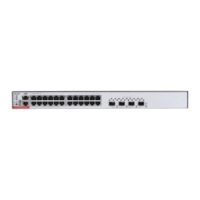Command Reference OSPFv3 Commands
MIB is bound to an OSPFv3 process with the smallest process number by default.
Routing process configuration mode
OSFPv3 MIB has no configuration information about OSFPv3 processes. You can operate only one
OSFPv3 process through SNMP. OSFPv3 MIB is bound to the OSFPv3 process with the smallest
process number by default. Users' operations take effect on this process.
To operate a specific OSFPv3 process through SNMP, you can bind OSFPv3 MIB to the process.
The following example enables users to operate the OSPFv3 process with the process number of 100
through SNMP.
Ruijie(config)# ipv6 router ospf 100
Ruijie(config-router)# enable mib-binding
Displays global OSPFv3 configuration
information.
Enables the OSPFv3 trap function.
OSPFv3 processes support eight types of trap information, which are classified into two categories.
Use this command to send specific trap information. Use the no form of this command to restore the
default setting.
enable traps [ error [ IfConfigError | IfRxBadPacket | VirtIfConfigError | VirtIfRxBadPacket ] |
state-change [ IfStateChange | NbrStateChange | NssaTranslatorStatusChange |
VirtIfStateChange | VirtNbrStateChange ] ]
no enable traps [ error [ IfConfigError | IfRxBadPacket | VirtIfConfigError | VirtIfRxBadPacket ] |
state-change [ IfStateChange | NbrStateChange | NssaTranslatorStatusChange |
VirtIfStateChange | VirtNbrStateChange ] ]

